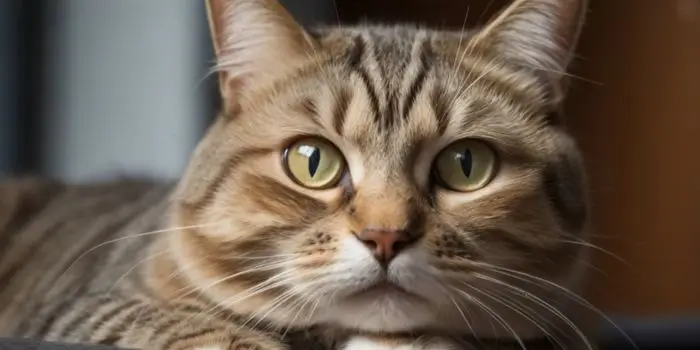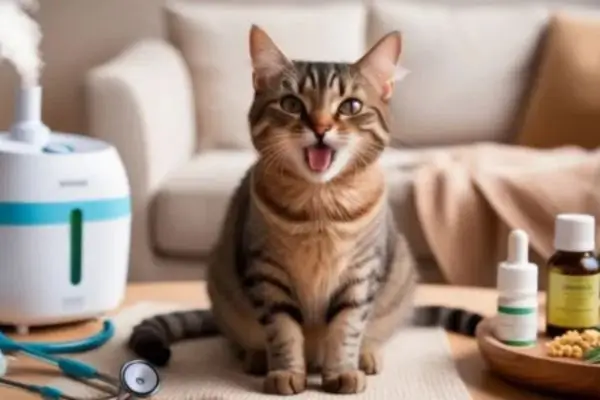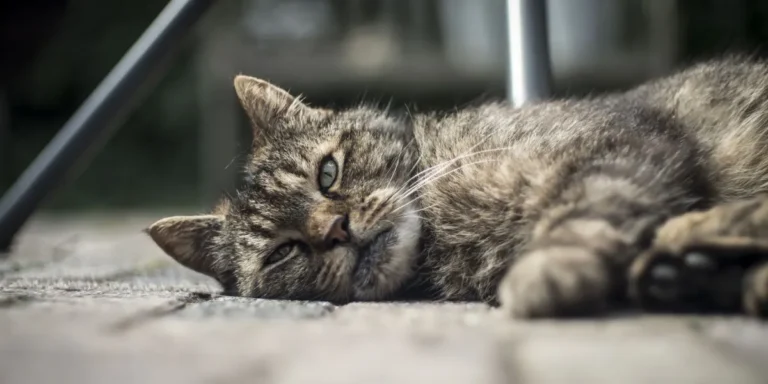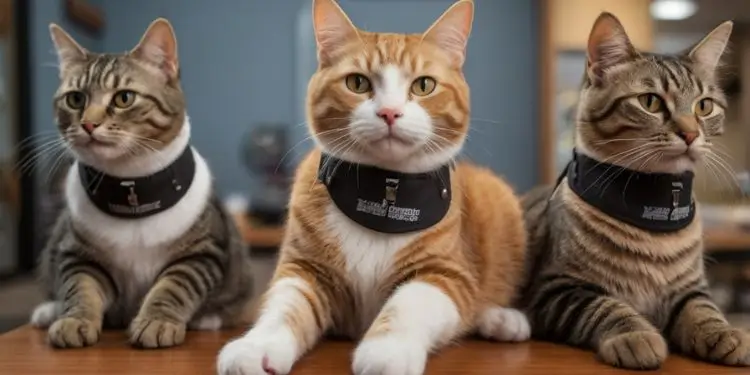Why Is My Cat Sneezing a Lot ?
Seeing your Cat Sneezing a Lot? 10 Signs You Should Know can be puzzling and worrying. Sneezing is normal for cats, just like for humans. But if your cat sneezes a lot or shows other symptoms, you should worry.
Sneezing helps cats get rid of irritants in their noses. But too much sneezing might mean there’s a health problem. This could be anything from a cold to dental issues or even cancer.
Table of Contents
Key Takeaways
- Occasional sneezing is normal in cats, but persistent or excessive sneezing may indicate an underlying health issue.
- Possible causes of cat sneezing include viral infections, bacterial or fungal infections, allergies, irritants, dental problems, and in rare cases, cancer.
- Accompanying symptoms like eye/nasal discharge, fever, fatigue, or difficulty breathing require prompt veterinary evaluation.
- Treating the underlying cause is crucial, with options ranging from medications to surgical intervention in severe cases.
- Maintaining good hygiene and reducing exposure to potential irritants can help prevent and manage recurrent sneezing in cats.
Understanding Normal vs. Excessive Cat Sneezing
As a cat owner, knowing when sneezing is normal or not is key. Cats sneeze sometimes due to excitement, movement, or dust. But, if sneezing is too much or comes with other signs, it might mean your cat needs a vet.
What Constitutes Normal Sneezing
Cats sneeze to get rid of small irritants in their noses. This kind of sneezing is rare and doesn’t last long. It can also happen when cats play or get excited, as a natural breathing response.
When Sneezing Becomes a Concern
If your cat sneezes a lot, it could be a sign of a bigger problem. Excessive sneezing might mean they have an infection, allergies, or another health issue. These need a vet’s help to diagnose and treat.
Differentiating Between Sneezing and Other Respiratory Sounds
Watching your cat’s breathing and sounds is crucial. Coughing, gagging, or wheezing might mean something else is wrong. A video of your cat’s breathing can help your vet figure out what’s going on.
If your cat keeps sneezing or shows other signs like nasal discharge or trouble breathing, see a vet. They can find and fix the problem.
Common Causes of Cat Sneezing a Lot
Cats sneeze a lot for many reasons. Viral respiratory infections like feline herpesvirus and calicivirus are big culprits. These viruses are common, especially in young cats or those from shelters.
Bacterial infections such as Bordetella, mycoplasma, and chlamydia also cause sneezing. These bacteria often cause yellow or green nasal discharge.
- Fungal infections, like Cryptococcus, can trigger sneezing in cats.
- Inflammation, irritants, and foreign objects stuck in the nasal passages can also cause persistent sneezing.
- Dental disease and certain types of neoplasia (tumors) may lead to sneezing as well.
Stress can make viral infections worse, leading to more sneezing. Keeping a clean home, feeding well, and regular vet visits are key. They help manage causes of cat sneezing and keep cats healthy.
| Cause | Description |
|---|---|
| Viral Infections | Feline herpesvirus and calicivirus are common viral infections that can cause persistent sneezing in cats. |
| Bacterial Infections | Bordetella, mycoplasma, and chlamydia are bacterial agents that can contribute to excessive sneezing, often indicated by yellow or green nasal discharge. |
| Fungal Infections | Cryptococcus is a fungal infection that can lead to sneezing in cats. |
| Inflammation and Irritants | Inflammation, foreign objects, and environmental irritants can cause persistent sneezing in cats. |
| Dental Disease and Neoplasia | Dental problems and certain types of tumors (neoplasia) may also result in sneezing in cats. |
| Stress | Stress can exacerbate the symptoms of viral infections, leading to increased sneezing episodes in cats. |
Knowing the common causes of cat sneezing helps owners and vets tackle the problem. This improves the life of feline friends.
Viral Infections: Primary Triggers for Sneezing
Viral infections are often the main cause of sneezing in cats. Feline herpesvirus and calicivirus are the top culprits, causing about 90% of cat colds.
Feline Herpesvirus
Feline herpesvirus is very contagious. It leads to sneezing, stuffy noses, and eye problems. Cats with this virus will always carry it, with flare-ups during stressful times.
Calicivirus and Other Viral Infections
Calicivirus is also contagious and causes sneezing, mouth sores, and breathing issues. Other viruses like feline infectious peritonitis, FIV, and leukemia can also make cats sneeze.
How Stress Affects Viral Symptoms
Stress can make viral symptoms worse in cats. Stress from changes or new pets can wake up dormant viruses. This leads to more sneezing and breathing problems.
There’s no cure for these viruses, but treatment focuses on managing symptoms. Regular vet visits, vaccinations, and a calm home can help. This reduces sneezing and keeps cats healthy.
Bacterial and Fungal Infections in Cats
While viral infections are the main cause of cat sneezing, bacterial and fungal infections can also play a role. It’s important for pet owners to understand these differences. This knowledge helps keep their cats healthy and happy.
Bacterial infections often follow viral infections in cats. Common culprits include Bordetella, mycoplasma, and chlamydia. These infections cause a yellowish or greenish nasal discharge. This is a sign that antibiotics are needed to treat the infection.
Fungal infections are less common but can also cause sneezing in cats. The main fungal infection is Cryptococcus. Diagnosing these infections requires advanced tests like rhinoscopy or biopsy. Treatment often involves antifungal medications.
| Infection Type | Prevalence | Causes | Symptoms | Treatment |
|---|---|---|---|---|
| Bacterial | Common | Bordetella, mycoplasma, chlamydia | Yellow/green nasal discharge | Antibiotics |
| Fungal | Less common | Cryptococcus | Sneezing, may require rhinoscopy or biopsy for diagnosis | Antifungal medications |
It’s vital to seek veterinary help quickly for bacterial and fungal infections in cats. By treating the underlying cause of your kitty keeps sneezing, you can ease your cat’s discomfort. This also helps prevent the condition from getting worse.

Environmental Irritants and Allergens
Sneezing in cats can be caused by things in their environment. Common culprits include cigarette smoke, strong perfumes, and pest control sprays. Dusty cat litter, harsh cleaning agents, scented candles, and household dust also play a role. Seasonal pollen and mold can make a cat’s nose even more sensitive, leading to sneezing.
Common Household Triggers
Many things in a cat’s world can make them sneeze. Cigarette smoke, strong smells, and chemical cleaners are big offenders. Keeping the air clean and using safe, scent-free products can help protect your cat.
Seasonal Factors
Pollen and mold are big allergens that change with the seasons. They can make cats sneeze, wheeze, and have stuffy noses. Keeping an eye on pollen and mold counts can help manage these allergies.
Prevention Strategies
- Identify and minimize exposure to known irritants and allergens in the home
- Use hypoallergenic, fragrance-free cat litter and cleaning products
- Ensure proper ventilation and air filtration in the home
- Regularly groom your cat to reduce allergens in their fur
- Monitor pollen and mold levels and take steps to limit your cat’s outdoor exposure during peak seasons
By reducing your cat’s exposure to irritants and allergens, you can prevent sneezing. This helps keep your cat’s respiratory system healthy.
Recognizing Serious Symptoms Accompanying Sneezing
When your cat sneezes a lot, watch for other signs that might mean they’re sick. Sneezing can be a sign of a bigger health problem. It’s important to notice any changes in how your cat acts or looks.
Some serious symptoms to watch for include:
- Eye discharge or ulcers
- Excessive nasal discharge, especially if it’s yellow or green in color
- Fatigue or lethargy
- Fever
- Drooling
- Decreased appetite or weight loss
- Enlarged lymph nodes
- Wheezing or coughing
- Poor coat condition
- Trouble breathing
- Diarrhea
If your cat sneezes blood, they need to see a vet right away. Sneezing a lot with other symptoms could mean a serious illness. This includes upper respiratory infections or other diseases. A vet should check it out.
Remember, cat sneezing symptoms can be different. It’s key to watch your cat’s health closely. If you see any big changes, call your vet. They can make sure your cat gets the right care.

“Cats can hide signs of illness, making it hard for owners to spot problems. Changes in behavior, appetite, or grooming can mean they’re not feeling well.”
By paying attention to your cat’s when to worry about cat sneezing and other symptoms, you can help them get the care they need. If you’re worried about your cat’s health, talk to your vet. They can help keep your furry friend healthy.
Treatment Options for Sneezing Cats
When your cat sneezes a lot, finding the cause is key. There are many ways to help, from medical treatments to home remedies. Knowing when to rush to the vet is also important for your cat’s health.
Medical Interventions
Your vet might give your cat medicine based on the cause. This could be antibiotics for infections, antiviral drugs for viruses, or steroids for swelling. Antifungal meds might be needed for fungal problems. Antihistamines can help with allergies.
Home Care Remedies
Home care can also help your cat feel better. A humidifier can ease nasal irritation and help your cat breathe better. Keeping your cat’s space clean and free of dust or strong smells is also helpful. Making sure your cat drinks enough water is another important step in cat sneezing treatment.
When to Seek Emergency Care
Sometimes, sneezing can mean a serious problem. If your cat sneezes blood, has trouble breathing, or seems very tired or hungry, get help fast. These signs could mean a bad infection, blockage, or even cancer. Quick vet care is vital for your cat’s health.
Dealing with how to treat cat sneezing means tackling the cause and supporting your cat’s recovery. Working with your vet and using home care can help your cat stop sneezing and stay healthy.
Prevention and Long-term Management
To keep your cat’s respiratory health in check, you need a few key steps. Regular vet visits, a clean home, and avoiding allergens are crucial. These steps help prevent cat sneezing and manage cat respiratory health over time.
Vaccines can stop some viruses that cause sneezing in cats. For cats with ongoing respiratory issues, the aim is to lessen symptoms. Good dental care also helps avoid sneezing caused by dental problems.
| Prevention Strategies | Benefits |
|---|---|
| Regular Veterinary Check-ups | Identify and address underlying health conditions early |
| Maintaining a Clean Environment | Reduce exposure to allergens and irritants |
| Minimizing Exposure to Triggers | Minimize frequency and severity of sneezing episodes |
| Proper Nutrition and Stress Reduction | Support the cat’s overall health and immune system |
| Consistent Dental Care | Prevent sneezing related to dental issues |
Using these prevention and management strategies can help your cat stay healthy. Early action and care are key to preventing cat sneezing and managing cat respiratory health for the long haul.
“The best prevention method for cat allergies is to avoid cats and their dander altogether.”
Conclusion
Knowing why and when cats sneeze is important for pet owners. Sometimes, sneezing is normal, but if it keeps happening, it’s time to see a vet. Getting your cat checked, keeping their area clean, and watching their health closely helps a lot.
It’s important to tell the difference between normal sneezing and signs of illness. Mild sneezing might just be from the air, but if it doesn’t stop, it could mean something serious. Watching your cat closely and getting help when needed helps keep them healthy.
Being proactive about your cat’s sneezing can really help. Keep their home clean and watch for any signs of trouble. By caring for your cat and talking to your vet, you can make sure they stay happy and healthy.







